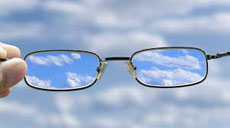“But God has blessed you, because your eyes can see and your ears can hear!”—Matthew 13:16(CEV).
When I was in sixth grade, I was diagnosed with myopia or nearsightedness, meaning I had the ability to see near objects more clearly than distant objects. To compound the diagnosis, I also had astigmatism, an imperfection of the cornea preventing part of it from focusing light onto the retina.
At 10-years-old, I was fitted for glasses. Because my eyesight was so bad, the lens in my glasses were thick in appearance, almost like the bottom of the classic soda pop bottle. As usual, children forced to wear glasses earn the nickname, “Four Eyes.” I was no exception. I admit, it hurt at the time.
When I reached high school, my vanity led me to ditch the glasses out in public. My parents wouldn’t buy contacts until I graduated and headed to college. I put up with the hard lenses in my eyes for three or four years until allergies made me forgo them. I returned to glasses.
During the next three or four decades I tried contacts again, this time the soft ones. Again, allergies made me miserable and the contacts were uncomfortable. Finally, I decided to stick with glasses. By this time, the material used for lenses had improved. Although I still needed a strong prescription, the lenses were thinner. I no longer looked as if I were sporting pop bottle bottoms in my frames. I actually looked forward to picking out new frames each time I visited my optometrist. It was almost as good as shopping for new shoes.
Several years ago, I had cataract surgery and chose to have a lens implanted in each eye. Now, I can see far off, which means I can drive without corrective lenses. However, now I have a new problem. I must wear reading glasses because I wasn’t keen on having one eye corrected for far-off vision and the other for close-up, like reading. I’d tried monovision contacts at one time but they made me dizzy, and I’m almost positive strangers thought I was winking at them when I was forced to close one eye or the other.
In a “Guideposts” article by Susanna Foth Aughtmon, she addresses something more important than our visual eyesight—our spiritual vision. She writes, “Sometimes I forget that my ‘spiritual’ vision is just as important or even more so. I can tend to let pride or self-righteousness cloud my vision which is beyond dangerous in Jesus’ eyes. He often called the Pharisees ‘blind guides.’ Not the best nickname for someone who thought they were trying to follow God and lead others along that path.”
When we keep our focus on Jesus, our spiritual vision is perfected. We see things through His eyes, no glasses, no contacts, no surgeries required. Isn’t that what God desires for His children?
Why not ask Jesus to open your “spiritual” eyes to see what is important today, to clearly see His will for your Life. You will be surprised at what you’ve been missing.

